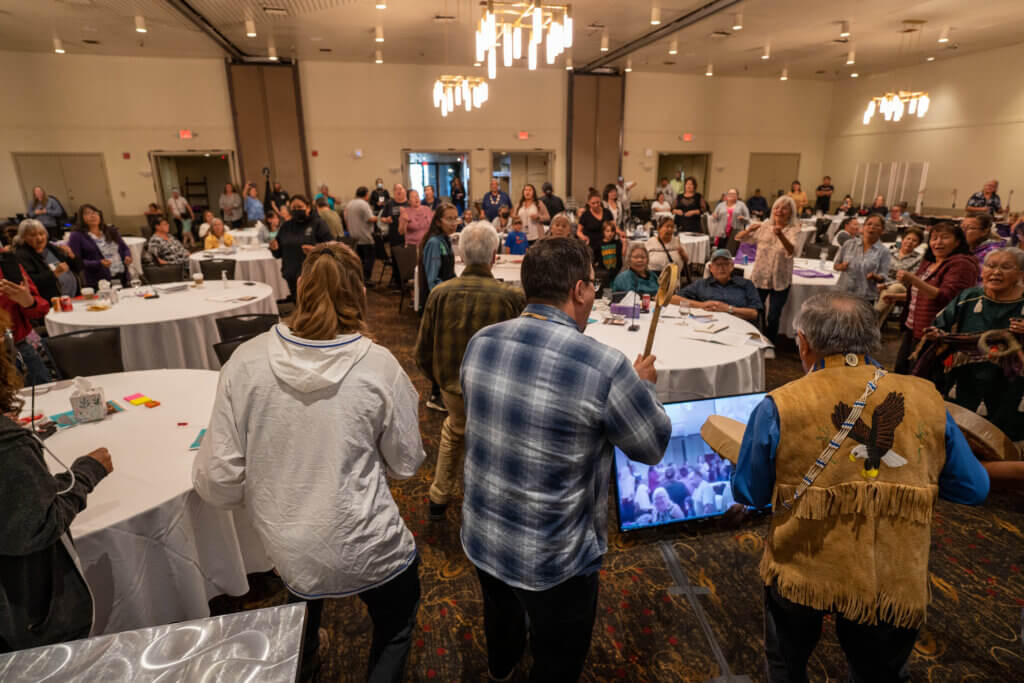The 38th Annual Alaska Tribal Court Conference returned to an in-person gathering for the first time since the COVID-19 Pandemic this year, with attendees from Alaska and beyond. This year’s theme was, “Traditional Values & Strong Tribes: Leading Our Justice System,” and immersed the audience in the noble purpose of Tribal Courts. Elders and Culture bearers led the conference in exemplifying and advocating the need for our Courts’ to follow the value system of their tribal community.

The original Alaska Tribal Court Conference began in the 1980’s shortly after the enactment of the Indian Child Welfare Act (ICWA), which acknowledged and affirmed federally recognized Tribes’ authority to transfer state ICWA cases to a Tribal Court. ICWA validated our Tribes’ inherent authority to handle their own child protection matters, and Tribes in Alaska started a large effort to reduce the number of children in State custody by transferring cases to the exclusive jurisdiction of their Tribal Courts.
The first documented Conference was held in Steven’s Village in 1983, and was hosted in various villages in the Region thereafter. During this time, the Conference was only attended by Tribes in the TCC Region. As the interest in operating formalized tribal courts grew, TCC decided move the Conference to Fairbanks in the early 1990s. Soon after, TCC opened the event to Tribes throughout Alaska and has actively worked to ensure the Conference has a good representation of all Tribes and Tribal Courts in Alaska statewide. Every year the Annual Alaska Conference is jointly sponsored by the Tanana Chiefs Conference and the University of Alaska Interior Aleutians Campus: Tribal Governance Program. The two have been partnering for many years to ensure our Tribes get the most current information, diverse presenters, and opportunities for technical support and assistance through UAF and/or TCC.
The 2022 Conference featured many moving Keynote Addresses, including Gene Tagoban, a Tlingit and Haida tribal member with Native Wellness Institute; Tami Jerue, an Anvik Tribal member and Director of Alaska Native Women Resource Center; and TCC Former Chief/Chairman and Tribal Elder of Tanana and Rampart, Will Mayo.
Speaking to the need for returning to tradition as tribes continue to expand their sovereignty, Will Mayo stated, “This is our home. We’ve got to do our homework. When we start to heal ourselves, forgiveness comes.”
In his speech during the “Traditional Healing through Modern Medicine” panel, Tribal Elder of Minto Luke Titus emotionally recounted his return to his ancestral practices after his experiences at Mt Edgecumbe. As he displayed each item of regalia that had been gifted to him upon his return, bringing him ever closer to his Culture, he weaved for the audience his tapestry of healing. Titus recalled each item coming with a blessing, reconnecting him to his community, his language, and his betterment. His traditional drum performance following the panel inspired tears throughout the audience, and spoke profoundly to the traditional ways as the lights on the pathway to sovereignty and healing for the collective of Alaskan tribal communities.
The inherent unity of tribes in Alaska was again prevalent in the “Engaging Parents and Providing Resources” panel, where Verna Solomon, Family Support Coordinator for TCC’s Tribal Social Services program, asserted poignantly, “Our job is to come alongside families, not over the top of them.”
On the third day, the Conference covered the Violence Against Women Act Reauthorization of 2022, and its impact on Alaskan villages. Alex Cleghorn, Senior Legal and Policy Director for the Alaska Native Justice System, displayed the timeline of the decline of tribal sovereignty over crimes committed in villages since Statehood and the passing of Oliphant in 1978, which asserted, “Tribes do not have inherent jurisdiction to punish non-Indians.” The reauthorization of VAWA this year is a positive direction for tribes toward regaining that sovereignty, because it allows tribes to enact justice in the case of violence in villages, as opposed to the state carrying this jurisdiction. The pilot program honoring the reauthorization is being implemented in chosen villages across the state, and will empower tribes with increased tribally operated infrastructure and processes by which tribal law can be practiced. This is a landmark event for tribes and their judicial sovereignty in Alaska.
Will Mayo received a standing ovation following his Welcoming Address on the final day of the Conference, with his call to the actions of healing. Invited guests on this day included Senators Lisa Murkowski and Dan Sullivan; U.S. District of Alaska Attorney S. Lane Tucker; Director of the Office of Children’s Services Kim Guay; and Deputy Attorney General of Alaska’s Criminal Division, John Skidmore.
If you are interested in more details from each panel, presenter materials will be available at this link within one week of the close of the conference.
